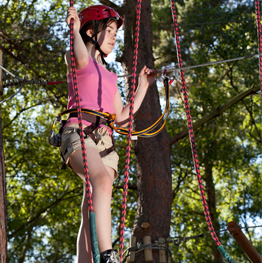
To many people, summer camp for kids might appear like nothing more than fun and games. However, a study conducted in the past few years support what camp directors have been saying for decades: Camp is a setting for positive youth development where invaluable life skills are acquired and nurtured.
“The major changes in [campers’] growth speaks tremendously of the summer camp experience,” says Troy Glover, director of the University of Waterloo’s Healthy Communities Research Network.
Glover spearheaded the Canadian Summer Camp Research Project, the first-ever nationwide and international research and evaluation project of its kind. Conducted in the summer of 2010, the study tracked 1,288 campers, aged three to 18, from 16 overnight and day camps across Canada. The research stage was divided into two parts: one-on-one interviews with camp directors to gather anecdotal evidence, followed by camper surveys to measure behaviors, attitudes and values. The results demonstrated that for ‘bubble-wrapped’ youth who have been over-programmed and over-protected, camp provides a safe environment to freely learn, grow and develop their capabilities. Summer camp, according to the study, fosters emotional intelligence (or EQ), self-confidence, independence, healthy living, environmental awareness, leadership and other skills that prove beneficial long into adulthood.
Check out the five critical life skills that get a huge boost at summer camp:
1. How to get along with others. Talk to any camp alumni and you’ll likely hear how some of their most meaningful friendships and lessons on how to get along with others came from camp. “One of the major benefits of camp is the social skills that develop, especially around interacting with other people in a positive way,” says Glover.
2. How to overcome challenges. It’s time to unwrap the ‘bubble wrapped’ generation. Saturated with 24-hour news highlighting crimes in their communities, many parents today are over-protective of their children. While Glover says statistically it’s safer now than it was when he was a child, parents are not as willing to let their kids out of their sight. This is where camp proves to be extremely beneficial. At camp, children are encouraged to go outside their comfort zone through activities such as high ropes courses, dramatic and musical performances or wilderness camping.
By allowing children to take risks and face challenges, camp helps children build their independence, resiliency and self-esteem in a safe, supervised and supportive environment, the study found.
3. How to get fit. A recent Statistics Canada study found that only 7 per cent of youth aged six to 19 got the recommended hour a day of exercise they need. With video games, social media and smartphones all vying for a young person’s attention, the national epidemic of obesity and inactivity won’t be easy to overcome. Enter summer camp, where physical activity is well disguised in the form of fun and games, allowing youth to adopt a healthy lifestyle, often without realizing it.
Along with banning the use of electronics, many camps provide a daily routine that involves waking up early, getting lots of physical activity, eating regular meals and spending extended periods of time outdoors.
4. How to love the Earth. A generation ago, bike rides around the neighborhood, skipping rope and outdoor games ‘til sunset were a big part of childhood. As children today tend to spend more time in front of TV and computer screens, nature-deficit disorder has become a modern ailment linked to obesity, anxiety and a decreased sense of environmental stewardship.
“Children need nature for the healthy development of their senses, and, therefore, for learning and creativity,” writes Richard Louv in his book Last Child in the Woods: Saving Our Children from Nature-Deficit Disorder.
An effective cure for this outdoors aversion? Camp.
According to findings from the Canadian Summer Camp Research Project, camp teaches youth how to live more environmentally-conscious lives.
“We found that familiarity with and appreciation of nature promotes environmentally-friendly habits in kids,” says Glover.
5. How to lead. When it comes to developing strong leaders, camp provides both implicit and explicit training, says Glover. Whether they’re on a canoe trip, playing capture the flag or living together in a cabin environment, campers are learning how to be a leader implicity through play and their everyday experiences, a form of experiential education.
“Kids don’t go to camp wanting to be better leaders or more self-aware - they go because it’s fun and the positive outcomes happen as a result,” says Glover.
According to the Canadian Summer Camp Research Project, most campers demonstrated an increase in emotional intelligence and self-confidence, both characteristics attributed to good leaders.
As campers enter their teenage years, there are more opportunities to obtain explicit leadership skills. Most camps offer an LIT (Leader-In-Training) or CIT (Counsellor-In-Training) program that walks young people through the skills they need to plan activities and programs, care for younger campers and communicate effectively.
Whether it’s by cleaning their cabins without being asked, helping younger campers find their way to the dining hall or contributing their talents to a play or talent show, youth of all ages learn to take initiative at camp.
Learning how to take the lead essentially teaches youth how to be good citizens - a skill that has become increasingly valuable in the 21st century, says Glover. “They learn that we all have a role to play to contribute to a better society, and nothing happens if you sit back and wait for someone else to act.”
For more information on the benefits of camp and to help give your kids the best summer camp experience this year, visit www.ourkids.net/camp/
Reprinted with permission by Our Kids, www.ourkids.net. Trusted by Canadian parents since 1998, Our Kids is your source to the best summer camps, private schools and extracurriculars. Get the information and feedback you need at ourkids.net.
Calgary’s Child Magazine © 2024 Calgary’s Child